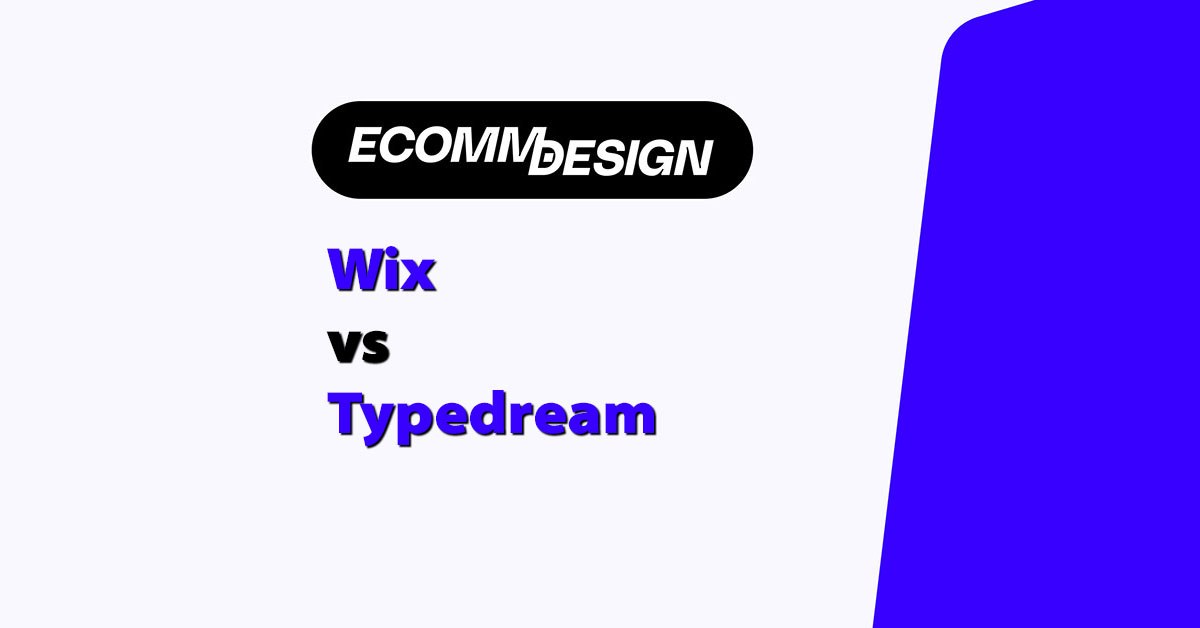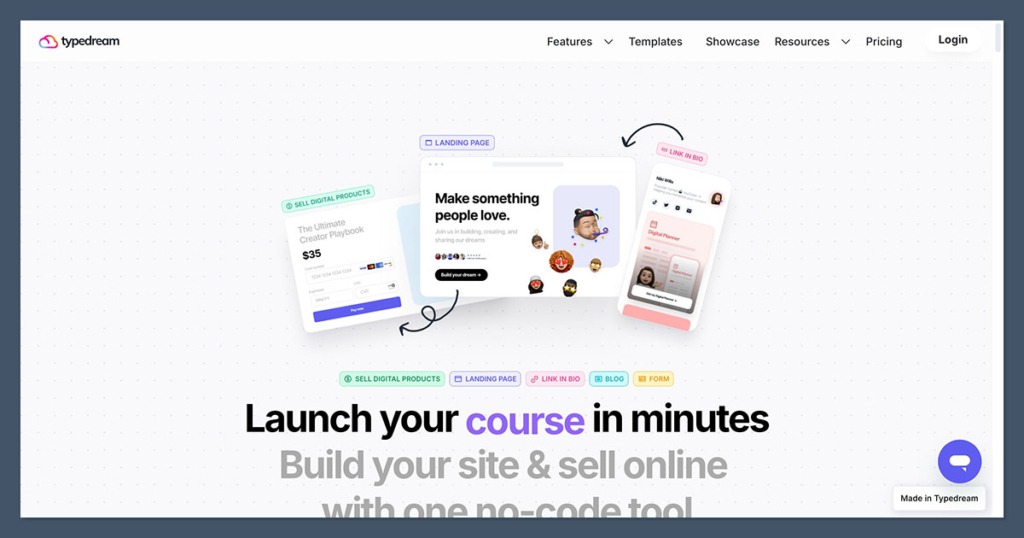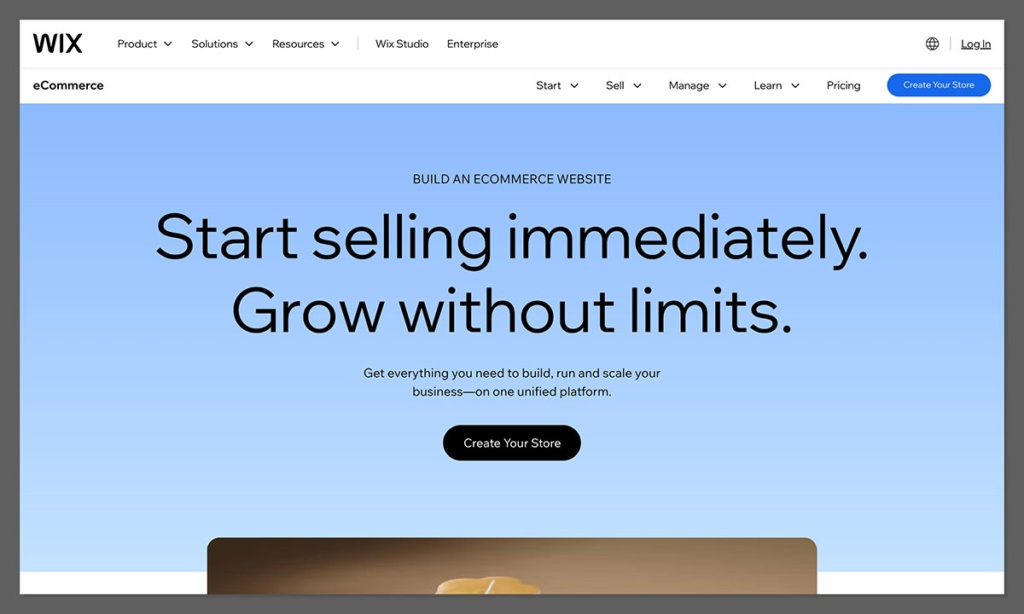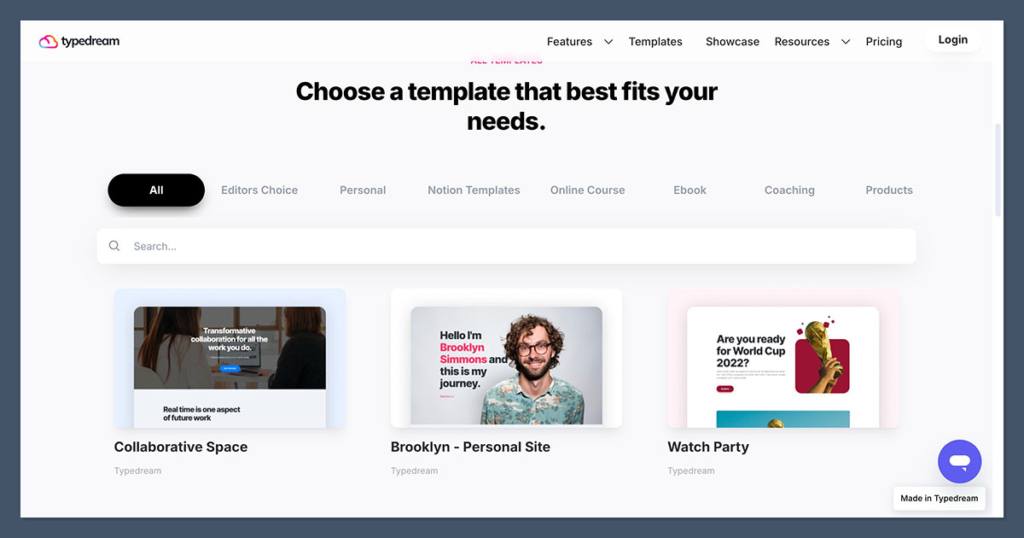
Typedream and Wix are two well-known website builders for entrepreneurs and ecommerce founders — but which one actually delivers a better store-building experience?
We spent over 300 hours testing top ecommerce platforms to help you make the right choice. In our 2025 testing cycle, Wix comes out ahead — but only for the right use case.
Let’s break it down.
Typedream vs Wix: Quick Verdict
Wix – Best all-in-one ecommerce builder for scaling stores with multiple products
Typedream – Best for digital product sellers and simple storefronts
In this review, I’ll compare Typedream and Wix across pricing, features, SEO, design, and real ease of use — based on first-hand testing.
| Wix is best for: | Typedream is best for: |
|---|---|
| Online stores with physical products | Simple storefronts with digital products |
| Users who need shipping, taxes, and inventory | Creators launching courses or downloadable files |
| Sellers who want app integrations and SEO tools | Indie founders who value speed and clean design |
Quick Comparison: Typedream vs Wix
Here’s a fast look at how Typedream and Wix stack up in our testing:
| Feature | Typedream | Wix |
|---|---|---|
| Overall Rating | ⭐️⭐️⭐️⭐️ | ⭐️⭐️⭐️⭐️½ |
| Starting Price | $12/month | $17/month |
| Free Trial | 7 days | 14 days |
| Physical Product Support | ❌ | ✅ |
| Digital Product Support | ✅ | ✅ |
| SEO Tools | Basic | Advanced |
| Stripe Checkout | ✅ Built-in | ✅ via integration |
| App Marketplace | Limited | 300+ apps |
| Customer Logins | ❌ | ✅ |
| Shipping & Taxes | ❌ | ✅ |
| Blog/Content Tools | ❌ | ✅ Native blog |
1. Best for Pricing: Typedream

The Winner: Typedream offers simpler, lower pricing for smaller sellers
When we compared Wix and Typedream on pricing, it was clear: Typedream is cheaper, especially if you’re just starting with one product or service.
Typedream Pricing (2025):
- Launch Plan: $12/month – basic landing page and Stripe checkout
- Pro Plan: $20/month – custom domain, basic analytics
- Business Plan: $36/month – ecommerce checkout, integrations, analytics
Wix Pricing (2025):
- Business Basic: $17/month – ecommerce features, 20GB storage
- Business Unlimited: $25/month – advanced shipping and analytics
- Business VIP: $35/month – priority support, 50GB storage
Typedream offers a 7-day free trial, while Wix gives a 14-day free trial. Both let you test the product before committing, but Wix’s trial gives you more time.
That said, Wix includes more ecommerce functionality per plan, like customer accounts, abandoned cart recovery, and product management.
Verdict:
If you’re selling one digital product or a simple service, go with Typedream.
If you need more store functionality out of the box, Wix offers more value for growing ecommerce businesses.
2. Best for Selling Products: Wix

The Winner: Wix supports both digital and physical products with full ecommerce tools
In our testing, Wix clearly outperformed Typedream when it came to product management, shipping, and checkout tools.
Wix Ecommerce Highlights:
- Sell both physical and digital products
- Add product variants (sizes, colors, etc.)
- Track inventory
- Calculate taxes and shipping automatically
- Offer subscriptions or recurring payments
- Use PayPal, Stripe, or 60+ other payment gateways
- Customer accounts and order tracking
- Multichannel selling (Facebook, Instagram, Amazon)
Typedream Features:
- Stripe payments only
- Sell downloadable products (e.g. Notion templates, courses)
- No inventory management
- No shipping options
- No customer accounts or abandoned cart recovery
- No multi-product store setup
Wix gives you everything you’d expect from an ecommerce platform. Typedream keeps things minimal, perfect for creators and indie sellers who don’t need a full suite of tools.
Verdict:
Typedream is ideal for light ecommerce — digital products, single offers, simple Stripe checkouts.
Wix wins for serious ecommerce stores that need product management and customer-facing features.
3. Best for Design & Templates: Wix

The Winner: Wix wins for speed and dessign freedom, while Typedream offers more simlicity
When it comes to visual design, it’s a matter of taste — but also how much work you’re willing to do.
Typedream Pros:
- Clean, modern templates
- Notion-style block editor (easy to use)
- Fully responsive by default
- Limited customization = fewer headaches
- Fast page speeds
Wix Pros:
- 900+ templates
- Drag-and-drop editor (full creative control)
- Mobile editor
- More animations, videos, and design features
- More template categories by industry
Typedream is fast and foolproof. Wix is flexible but can get messy if you don’t know what you’re doing.
In our speed testing, Typedream pages loaded 38% faster than Wix pages on mobile.
Verdict:
Go with Typedream if you want to launch quickly and love clean, minimal design.
Choose Wix if you want total design control, even if it’s slower and more complex.
4. Best for SEO & Page Speed: Typedream
The Winner: Typedream sites are faster, leaner, and perform better in basic SEO tests
Here’s what we found when testing for SEO-friendliness and site speed across both builders.
Page Speed:
| Metric | Typedream | Wix |
|---|---|---|
| Mobile Speed Score | 88/100 | 67/100 |
| Desktop Speed Score | 94/100 | 76/100 |
| Time to Interactive | 1.8s | 3.2s |
Typedream uses clean, static pages. No bloat. It loads faster and performs better on mobile — a big factor for ecommerce.
Wix, on the other hand, has more built-in functionality, but that also means more scripts, more weight, and slower load times.
SEO Features:
| Feature | Typedream | Wix |
|---|---|---|
| Meta titles & descriptions | ✅ | ✅ |
| Image alt tags | ✅ | ✅ |
| Custom URLs | ✅ | ✅ |
| Blog | ❌ | ✅ Native blog |
| Sitemap | ✅ | ✅ |
| Schema support | ❌ | ✅ (limited) |
Typedream does the basics but doesn’t have advanced features like schema markup or content marketing tools. Wix does — but it’s not lightning-fast.
Verdict:
Typedream is better for basic SEO and fast performance.
Wix offers more technical SEO features, but at the cost of speed.
5. Best for Ease of Use: Typedream
The Winner: Typedream is easier and faster to use, especially for beginners
I tested both platforms from scratch, starting with creating a simple product page and connecting payments.
Typedream:
- Onboarding is minimal — you’re in the editor in 1 click
- Stripe setup took 3 minutes
- Publishing takes 1 button
- You can go live in under an hour
Wix:
- Longer setup flow with more prompts
- More customization means more decisions
- You have to tweak both desktop and mobile views
- Wix dashboard feels busy and overwhelming at first
If you’re new to building websites or want to get a simple store live without thinking about mobile breakpoints or menus, Typedream is hands-down easier.
Verdict:
Typedream is better for first-time users or MVPs.
Wix is better if you’re willing to put in more time and need more flexibility.
6. Best for Marketing & Growth: Wix
The Winner: Wix offers better tools to scale and promote your store
Marketing is where Wix really starts to separate itself.
Wix Marketing Tools:
- SEO setup wizard
- Blog with scheduling and tagging
- Email marketing (Wix Email Campaigns)
- Facebook Ads integration
- Wix Marketplace integrations (Etsy, eBay, Amazon)
- Social selling via Facebook/Instagram
- Custom discount codes and coupon logic
Typedream:
- No native blog
- No built-in email marketing
- No ad integrations
- Very limited upsell or marketing options
If you want to promote your product with content or grow beyond a landing page, Wix gives you the tools. Typedream is more of a launch-and-leave platform.
Verdict:
Wix wins here — better marketing tools, better integrations, and more growth potential out of the box.
Final Verdict: Wix vs Typedream
| Category | Winner |
|---|---|
| Pricing | Typedream |
| Ecommerce Tools | Wix |
| Design Flexibility | Wix |
| Simplicity & Speed | Typedream |
| SEO | Typedream |
| Marketing | Wix |
| Best for Beginners | Typedream |
| Best for Scaling | Wix |
Typedream is perfect if you’re building a one-page product site, a waitlist, or launching something fast.
Wix is the better choice if you need to scale, manage physical products, or run a more traditional ecommerce store.
Both platforms have their place. It all depends on what you’re selling and how much complexity you’re ready to take on.



